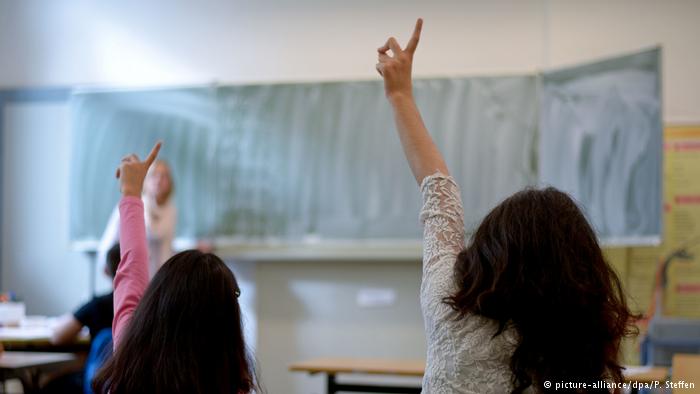Alemania/Noviembre de 2016/Fuente: DW
RESUMEN: El párrafo 4 del artículo 7 de la «Ley Fundamental» garantiza el derecho a establecer escuelas privadas como alternativa a las escuelas estatales, pero sólo sujeto a su aprobación por los gobiernos estatales, quienes son responsables de la educación en Alemania. «Tal aprobación se dará cuando las escuelas privadas no sean inferiores a las escuelas estatales en cuanto a sus objetivos educativos, sus instalaciones, o la formación profesional de su profesorado, y cuando no se segreguen los alumnos según los medios de sus padres Alentado por ello «, dice el párrafo. Pero el estudio de WZB encontró que la mayoría de los gobiernos estatales alemanes no hacen cumplir ese principio, y algunos ni siquiera tienen regulaciones en su lugar para hacerlo.
Article 7, Paragraph 4 of the «Basic Law» guarantees the right to establish private schools as an alternative to state schools – but only subject to their approval by state governments, who are responsible for education in Germany. «Such approval shall be given when private schools are not inferior to the state schools in terms of their educational aims, their facilities, or the professional training of their teaching staff, and when segregation of pupils according to the means of their parents will not be encouraged thereby,» the paragraph reads.
But the WZB study found that most German state governments do not enforce that principle, and some don’t even have any regulations in place with which to do so.
Blind eyes turned
The two authors of the report, law professor Michael Wrase and sociologist Marcel Helbig, identified nine basic laws that would have to be in place to enforce the German constitution as it is written, including a cap on school fees or guarantees that children from low-income families do not have to pay them.
They found that none of Germany’s 16 states implement all nine of these principles, while two, Rhineland-Palatinate and North Rhine-Westphalia, had five of them in place. Two other states, Thuringia and Bremen, had no regulations at all. On top of that, no state formally assesses private schools’ intake strategy.
Although many states impose some kind of cap on school fees – in 2010, a court in Stuttgart put the limit at 150 euros ($160) a month – private schools have found myriad ways to get round them, even if they have a sliding scale for basic fees based on parents’ income.
The Berlin Cosmopolitan School, for instance, charges extra for bilingual classes, special courses and extracurricular activities, while the Metropolitan School in Berlin includes extra charges for lunch (for all students), «digital media fees,» and class trips and external exams.
According to Wrase, well-off parents can easily end up paying up to 800 euros a month for their child’s schooling. «It’s obvious that if I have one child that brings in 800 euros a month and another that brings only 250 euros, then for economic reasons I’ll probably take the child coming from a richer home,» said Wrase.
Unique situation
Germany is fairly unique among Western countries in its aversion to elite high schools – the Weimar constitution of 1919 established that schools should be under state oversight and open to all children – although schools run by religious institutions were protected – something which found its way into the Federal Republic’s Basic Law in 1949. Ever since, Germany has not had elite schools like those in the UK or the US.
Private schools in Germany still get the majority of their budget from the state, which means they can’t claim complete independence, but also that they have a significantly higher budget that allows them to offer better services – at a cost to the taxpayer. But according to the letter of the German law, even children of low income parents should have access to them – though the WZB shows that they do not.
«As a consequence, it has become clear that schools in any given region are getting more and more unequal,» said Wrase. «This is especially true in larger cities, where you have state schools in more difficult circumstances with more difficult children – where parents are more inclined to send their children to a fancy private school.»
Some state governments – including Baden-Württemberg and Berlin – have indicated their intention to reassess their oversight of private schools in the wake of the WZB report. The German association of private schools (VDP) did not respond to requests for comment.
Fuente: http://www.dw.com/en/german-private-schools-violating-constitution/a-36496731







 Users Today : 16
Users Today : 16 Total Users : 35460399
Total Users : 35460399 Views Today : 34
Views Today : 34 Total views : 3419197
Total views : 3419197